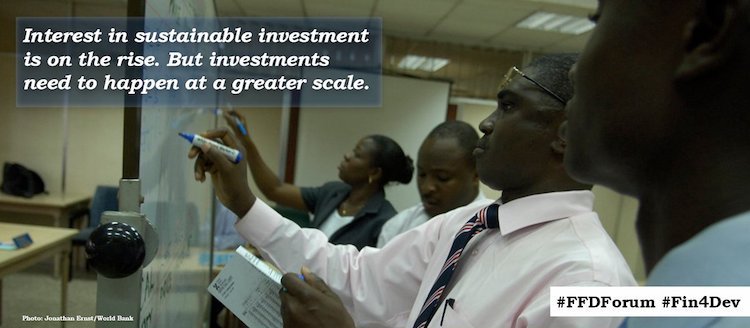
By J Nastranis
NEW YORK (IDN) – Much to the United Nations’ dismay, desperately missing funds are imperiling realization of the 2030 Agenda for Sustainable Development. Investments that are critical to achieving the Sustainable Development Goals remain underfunded and parts of the multilateral system are under strain, warned a new report as the fourth Forum on Financing for Development opened on April 15, 2019 at the UN Headquarters.
“Uneven growth, rising debt levels, possible upticks in financial volatility, and heightened global trade tensions” are hampering progress on reaching the Sustainable Development Goals (SDGs), UN Secretary-General António Guterres told the four-day Forum, during what he called “a critical moment” to “accelerate action for sustainable development”.
Climate change, greenhouse gas emissions and technologies disrupting labour markets, were a major challenge, he said. “We are here today as part of an effort to coordinate an urgent global response to reverse these trends,” he added. “Simply put, we need more money to implement the Sustainable Development Goals.”
Inga Rhonda King, President of the Economic and Social Council (ECOSOC) opened the meeting by highlighting that while progress has been made, “we have not seen the broad transformation that we need, to achieve the SDGs by 2030”.
“Climate change, from the Caribbean to the Sahel”, which has actively reversed development gains; rising debt levels, which stifle investment in sustainable development; and increasing trade tensions dampening economic growth and inequalities within countries, she added.
For addressing these risks, she King stressed the need to: renew commitments to global multilateral cooperation; align financing frameworks to integrate the 2030 Agenda into national development strategies; and accelerate the financing of sustainable development.
“Trust in the multilateral system itself is eroding, in part because we are not delivering inclusive and sustainable growth for all,” wrote Guterres in his foreword to the 2019 Financing for Sustainable Development Report.
“Our shared challenge is to make the international trading and financial systems fit for purpose to advance sustainable development and promote fair globalization,” he said in the joint report of the Inter-agency Task Force on Financing for Development, which includes the International Monetary Fund, the World Bank Group and World Trade Organization.
The Task Force was mandated by the Addis Ababa Action Agenda and is chaired by Zhenmin LIU, Under-Secretary General for Economic and Social Affairs.
Unless national and international financial systems are revamped, the world’s governments will fail to keep their promises on such critical issues as combatting climate change and eradicating poverty by 2030, warned the report.
In what sounds good news, the report noted that investment has gained strength in some countries and interest in sustainable investing is growing, with 75 per cent of individual investors showing interest in how their investments affect the world.
Nevertheless, greenhouse gas emissions grew 1.3 per cent in 2017; investment in many countries is falling; and 30 developing countries are now at high risk or already in debt distress. At the same time, global growth is expected to have peaked at around 3 per cent.
Changing the current trajectory in financing sustainable development is not just about raising additional investment, said the report. Achieving global goals depends on supportive financial systems, and conducive global and national policy environments.
Yet the report warned that creating favorable conditions is becoming more challenging. Rapid changes in technology, geopolitics, and climate are remaking our economies and societies, and existing national and multilateral institutions — which had helped lift billions out of poverty — are now struggling to adapt.
Confidence in the multilateral system has been undermined, in part because it has failed to deliver returns equitably, with most people in the world living in countries with increasing inequality.
The UN and other international agencies recommend concrete steps to overhaul the global institutional architecture and make the global economy and global finance more sustainable, including:
— supporting a shift towards long-term investment horizons with sustainability risks central to investment decisions;
— revisiting mechanisms for sovereign debt restructuring to respond to more complex debt instruments and a more diverse creditor landscape;
— revamping the multilateral trading system;
— addressing challenges to tax systems that inhibit countries from mobilizing adequate resources in an increasingly digitalized world economy; and
— addressing growing market concentration that extends across borders, with impacts on inequality.
The report puts forward a roadmap at the national level for countries to overhaul their public and private financial systems to mobilize resources for sustainable investment. It introduces tools for countries to align financing policies with national sustainable development strategies and priorities.
One example of the opportunities and challenges the report discusses is in new technologies and fintech (digitally enabled innovation in the financial sector). With more than half a billion people gaining access to financial services in recent years, the appeal of fintech is clear, says the report.
But as new players enter and rapidly change the financing marketplace, regulators struggle to keep pace. As fintech grows in importance, activities outside the regulatory framework, if left unsupervised, may put financial stability at risk, warns the report.
Fintech’s promise can pay off with regulatory approaches that address these concerns, but these need to be implemented without stifling innovation. To this end, the report emphasizes the importance of discussions between fintech companies, financial institutions and regulators.
It finds that regulatory attention will need to shift to financial activities and their underlying risks, no matter the entity that engages in them, rather than by institutional type.
“We have a major opportunity to overcome bottlenecks in sustainable financing in 2019,” says Liu Zhenmin, Under-Secretary-General for Economic and Social Affairs and Chair of the Task Force that issued the report. “The responsibility rests with governments to recommit to multilateralism, and to take policy actions that will create a sustainable and prosperous future.” [IDN-InDepthNews – 15 April 2019]
Photo: Jonathan Ernst | World Bank
IDN is flagship agency of the International Press Syndicate.
facebook.com/IDN.GoingDeeper – twitter.com/InDepthNews











